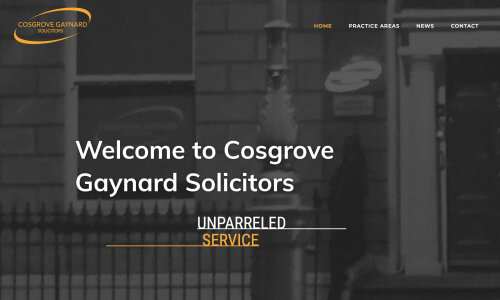Best Probate Lawyers in Dublin
Share your needs with us, get contacted by law firms.
Free. Takes 2 min.
List of the best lawyers in Dublin, Ireland
About Probate Law in Dublin, Ireland
Probate law in Dublin, Ireland, concerns the legal process of administering a deceased person's estate. This process ensures that the deceased's debts are paid and their assets are distributed according to their will, or if they didn’t leave a will, based on the rules of intestacy. Probate is handled by the Probate Office at the Central Office of the High Court, which grants the necessary authorizations to executors or administrators so they can manage the estate legally. The executor, named in the will, or an administrator, appointed if there is no will, plays a crucial role in this process.
Why You May Need a Lawyer
Engaging a lawyer experienced in probate law can be crucial for several reasons. If the deceased's estate is particularly large or complicated, involving numerous assets or debts, legal guidance can prevent costly mistakes. Disputes among beneficiaries or challenges to the will's validity may also require legal input to mediate or litigate matters effectively. Furthermore, understanding the specific procedural requirements and documentation involved in probate can be overwhelming, and a lawyer can streamline this process, ensuring compliance with all legal obligations.
Local Laws Overview
Dublin, as part of Ireland, follows the standard probate laws applicable across the country. A notable aspect is that the process involves obtaining a Grant of Probate if there is a will, or a Grant of Administration if there's no will. The Succession Act 1965 governs the distribution of intestate estates, ensuring that the deceased’s closest relatives inherit according to a pre-defined hierarchy. The Capital Acquisition Tax may apply to beneficiaries depending on their relationship to the deceased and the value of their inheritance. Local practices, like filing with the Probate Office in Dublin, emphasize the importance of accuracy and thorough documentation.
Frequently Asked Questions
What is the timeframe for completing the probate process?
The probate process in Dublin can vary in length, typically taking from several months to over a year, depending on the complexity of the estate and any disputes or issues that arise during the administration.
Do all estates require probate?
Not all estates require probate. If assets were held jointly or designated beneficiaries, those assets usually transfer directly upon the owner's death. However, any assets solely in the deceased's name typically need probate to be transferred legally.
What documents are needed to start probate?
Essential documents include the original death certificate, the original will (if one exists), details of the deceased’s assets and liabilities, and an Inland Revenue Affidavit for tax purposes.
How are debts dealt with during probate?
Debts and liabilities of the deceased are settled first before distributing the remaining assets to beneficiaries. Executors are responsible for identifying and paying off all outstanding debts.
Can probate be contested?
Probate can be contested, particularly if there are concerns about the will’s validity or if someone believes they were unjustly excluded. Legal advice is critical in such cases to address potential disputes successfully.
What if there is no will?
If there is no will, the estate is considered intestate, and the Succession Act 1965 outlines how the estate is distributed among surviving relatives according to statutory priorities.
What is the role of the Probate Office?
The Probate Office issues the Grant of Probate or Administration, authorizing the executors or administrators to handle the deceased’s assets, settle debts, and distribute the estate as per protocol or law.
Is there a time limit for applying for probate?
While there is no strict time limit on applying for probate, it’s advisable to do this as soon as possible to settle the estate promptly. Delays can prolong the distribution of assets and may impact the estate's value.
Are all wills automatically valid?
No, for a will to be valid, it must satisfy legal requirements, such as being signed by the testator and witnessed by two persons who are not beneficiaries. Contested wills must undergo scrutiny to confirm their validity.
What is a Grant of Probate?
A Grant of Probate is a legal document issued by the Probate Office confirming an executor’s authority to administer the deceased's estate as per their will.
Additional Resources
Several resources and organizations can be beneficial if you seek further assistance on probate matters in Dublin:
- Probate Office of the High Court - Handles the administration of probate applications.
- Law Society of Ireland - Offers a directory of qualified solicitors specializing in probate law.
- Citizens Information - Provides general information about the probate process and relevant legal considerations.
- Revenue Commissioners - Details regarding the Capital Acquisition Tax and related inheritance tax matters.
Next Steps
If you need legal assistance, consider taking the following steps:
- Gather all necessary documents related to the deceased's estate, including the death certificate, any will, and a comprehensive list of assets and liabilities.
- Consult with a solicitor experienced in probate law to evaluate your situation and guide you through the process. Seek recommendations or consult the Law Society of Ireland for qualified professionals.
- Engage with the Probate Office for official procedures, ensuring you meet all obligatory submissions and documentation requirements.
- In cases of disputes or contestations, receive legal counsel to address the issues effectively and explore mediation or litigation options if necessary.
Seeking timely and knowledgeable legal advice can ensure that the probate process is managed efficiently and in accordance with Irish law.
Lawzana helps you find the best lawyers and law firms in Dublin through a curated and pre-screened list of qualified legal professionals. Our platform offers rankings and detailed profiles of attorneys and law firms, allowing you to compare based on practice areas, including Probate, experience, and client feedback.
Each profile includes a description of the firm's areas of practice, client reviews, team members and partners, year of establishment, spoken languages, office locations, contact information, social media presence, and any published articles or resources. Most firms on our platform speak English and are experienced in both local and international legal matters.
Get a quote from top-rated law firms in Dublin, Ireland — quickly, securely, and without unnecessary hassle.
Disclaimer:
The information provided on this page is for general informational purposes only and does not constitute legal advice. While we strive to ensure the accuracy and relevance of the content, legal information may change over time, and interpretations of the law can vary. You should always consult with a qualified legal professional for advice specific to your situation.
We disclaim all liability for actions taken or not taken based on the content of this page. If you believe any information is incorrect or outdated, please contact us, and we will review and update it where appropriate.














